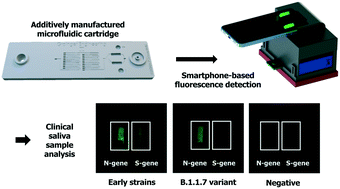Since the beginning of the COVID-19 pandemic, several mutations of the SARS-CoV-2 virus have emerged. Current gold standard detection methods for detecting the virus and its variants are based on PCR-based diagnostics using complex laboratory protocols and time-consuming steps, such as RNA isolation and purification, and thermal cycling. These steps limit the translation of technology to the point-of-care and limit accessibility to under-resourced regions. While PCR-based assays currently offer the possibility of multiplexed gene detection, and commercial products of single gene PCR and isothermal LAMP at point-of-care are also now available, reports of isothermal assays at the point-of-care with detection of multiple genes are lacking. Here, we present a microfluidic assay and device to detect and differentiate the Alpha variant (B.1.1.7) from the SARS-CoV-2 virus early strains in saliva samples. The detection assay, which is based on isothermal RT-LAMP amplification, takes advantage of the S-gene target failure (SGTF) to differentiate the Alpha variant from the SARS-CoV-2 virus early strains using a binary detection system based on spatial separation of the primers specific to the N- and S-genes. We use additively manufactured plastic cartridges in a low-cost optical reader system to successfully detect the SARS-CoV-2 virus from saliva samples (positive amplification is detected with concentration ≥10 copies per μL) within 30 min. We demonstrate that our platform can discriminate the B.1.1.7 variant (USA/CA_CDC_5574/2020 isolate) from SARS-CoV-2 negative samples, but also from the SARS-CoV-2 USA-WA1/2020 isolate. The reliability of the developed point-of-care device was confirmed by testing 38 clinical saliva samples, including 20 samples positive for Alpha variant (sensitivity > 90%, specificity = 100%). This study highlights the current relevance of binary-based testing, as the new Omicron variant also exhibits S-gene target failure and could be tested by adapting the approach presented here.
